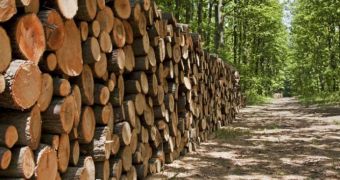This past March 25, the Environmental Investigation Agency released a new report showing that 72% of Myamar's overall log exports between the years 2000 and 2013 were most likely illegal ones. This report stands as proof that, for the time being, the country is dealing with a major illegal logging crisis.
Using data provided by Myanmar's Ministry of Environmental Conservation and Forestry, the Agency found that, out of 22.8 million cubic meters of logs that the country sent to several regions across the world within said time frame, just 28% were accounted for by official reports.
This means that over three-fourths, i.e. 16.4 million cubic meters, of the country's total log exports between 2000 and 2013 were illegally logged and then shipped to other countries, the Environmental Investigation Agency maintains.
According to the Agency, the value of Myanmar's illegal log exports within said period amounted to an impressive $6 billion (€4.34 billion). To put things into perspective, it must be said that this sum of money is four times the entire country's education and health budgets for the years 2013-2014.
“The forestry sector is in crisis [in Myanmar]. Logging is rampant, transparency non-existent. Drivers include consumers' need for cheap raw materials in the form of logs and in particular Myanmar’s precious hardwoods,” Faith Doherty with the Agency told Mongabay in a recent interview.
Apart from the fact that reports on how much logs were imported into other countries from Myanmar and how much logs supposedly left the country do not see eye to eye, it would appear that data on harvest volumes is not exactly accurate either.
Thus, the Environmental Investigation Agency maintains that, when compared to reported imports, official harvest volumes for the period between 2000-2013 only accounted for 53% of the total volume of logs that ended up in other countries.
This means that the country had an illegal logging rate of 47% for export activities alone. All things considered, it is very possible that Myanmar lost even more forest coverage, except that the logs resulting from these other logging activities were not exported.
Faith Doherty argues that, in order for Myanmar's illegal log exports to reach such worrying levels, corruption must also be flourishing. “The Government’s official data on forestry and timber exports reveals endemic illegal logging and timber smuggling – crimes only possible through institutional corruption on a huge scale,” the Forest Campaign Leader said in a statement.
In an attempt to put a dent in illegal logging and export activities, Myanmar is to implement a ban on exporting raw logs. The ban in question is expected to come into effect this April 1, but the Environmental Investigation Agency argues that it will probably not be enough to make things take a turn for the better.
“By proposing a log export ban from April 1, 2014, the Government of Myanmar is acknowledging that vast amounts of the country’s forests raw material in the form of logs have been looted and sold at less value than they are worth. The log export ban in itself is just not enough. More needs to be done,” Faith Doherty argues.
The Agency is asking that, apart from implementing this ban, the country make the management of forest resources more transparent, investigate and prosecute people guilty of illegal logging and timber smuggling, and shake off corruption.

 14 DAY TRIAL //
14 DAY TRIAL //